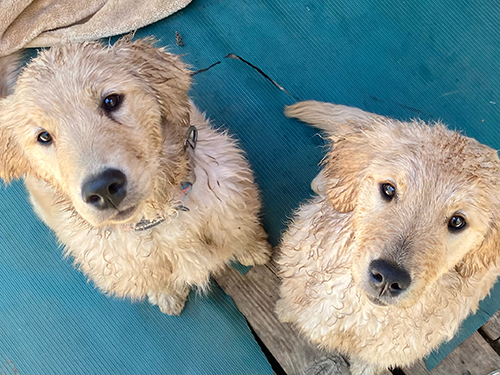
By Fran Jewell
Most of us make play dates with other dogs, especially for our puppies, so they learn how to interact appropriately with other dogs. While this is a GREAT idea, many times playtime teaches dogs to become nuts and uncontrollable around other dogs. One of the biggest concerns people call me about is that their dogs “come” very well except when they see another dog!
Well, unfortunately, we probably unconsciously taught that to our dogs as puppies by letting them have play dates that are wild free-for-alls.
Play dates can be a marvelous place to use as a training opportunity. It isn’t just our time to chat on our cellphones or drink wine with our friends.
What can you teach during playtime? Two VERY important skills:
How to “come” even when there is another dog around.
“Impulse control,” which is the new jargon for self-control.
To start teaching impulse control as the playtime outing begins, start by not letting your dog out of the car until they sit and look at you. These are skills that should be taught in a low-distraction situation first. Then, attach a leash. Have your dog sit and look at you again. Reward your dog with a special treat to help him feel good about sitting and waiting to get out. Use a release word such as “release” or “alright.” Do not use “okay” since we use that word too much in our everyday conversations. The goal to work towards is waiting until your dog settles before releasing him to get out. Let him drag the leash for the playtime.
It will seem like the leash is such a bother but here is where it becomes such a wonderful tool. As your dog (hopefully as a puppy) is playing gleefully with the other dog, walk over to the play, grab the leash and say his name. Draw him away from the play with the best treat he can imagine. Maybe use some cooked chicken breast or freeze-dried liver. Gently pull him away from the playtime, using the leash if necessary. When your dog comes away from the play, ask him to sit, then reward with lots of goodies. Have him look at you again, then say, “go play!” and let him go back to playtime. Let him play for a bit. Do this several times until he willingly comes from the play without you having to use the leash. Once you get to this point, start saying “come” as he comes to you. The owner of the other dog can do the same thing at the same time, which will help tremendously.
Two of the biggest mistakes I see is using the word “come” and ending the playtime to go home. Then “come” becomes an evil word. If you start associating “come” with food, and a moment of rest and cooperation, pretty soon “come” becomes a wonderful game and no longer associated with ending a good time. Then the leash can come off.
The same exercises can be done with your dog before and during hikes to create an excellent recall in the woods.
A dog with self-control is a safe dog. A dog that jumps out of a vehicle anticipating playtime or a walk can be dangerous. He may actually jump out, knocking someone over or into an unexpected car!!! Incorporating some simple obedience exercises can help you have safe adventures and FUN ones, too!
Fran Jewell is an IAABC Certified Dog Behavior Consultant, NADOI Certified Instructor and the owner of Positive Puppy Dog Training, LLC in Sun Valley. For more information, visit positivepuppy.com or call 208-578-1565.


